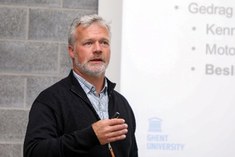KBVB/RBFA Chair: Towards an integrated development model for the young footballer
INTRODUCTION
This chair grew out of the Royal Belgian Football Association's concern about the challenges associated with the development of the young footballer. Every week, hundreds of thousands of young players in Belgium enthusiastically put on their football boots, dreaming of one day being part of the Red Devils or the Red Flames. Because of the size and organisation of football in Belgium, this context can be seen as a reflection of our society, in which we strive to bring every player to optimal performance and experience of success. Every club is looking for talent, but finding talent brings challenges, where disappointment and success, selection, deselection and redirection, promotion and drop-out are very often close to each other. We are convinced that scientific research can still contribute a lot to the optimal development of each young player, by zooming in on individual characteristics of the player, but equally on the environment in which he/she is trained.
OBJECTIVES
With this chair, we want to offer research support in the field of detection, identification, selection and development of the young football player. The role of individual characteristics of football players in different phases of their career, the framework at club and team level, and the factors that determine the transition to the next phase are the subject of innovative research. This research can eventually form the basis for an evidence-based, optimised and successful development model that can lead to satisfaction for the federation, clubs, trainers, and every young footballer. This chair offers the opportunity to take a multidisciplinary and holistic approach to research, looking not only at talented players, but equally keen to explore how less gifted players can still achieve satisfaction and experience success, inside or outside the lines of the football field.
SCHENKER(S)
Royal Belgian Football Association (RBFA)
PERIOD
2023-2027
PROMOTORS
Matthieu Lenoir is full professor at the Department of Movement and Sports Sciences at Ghent University. After obtaining his PhD (°1997), he focused his research on human motor development, covering both measurement methods, the determinants of motor activity, and intervention studies for its promotion. The research focuses both on healthy toddlers, children and adults, individuals with conditions that impact motor skills and health (e.g. childhood obesity), and young (elite) athletes in the context of talent identification and development. He was/is a promoter of research projects that explicitly aim at societal valorisation in the field of movement and sport. For example, he was at the cradle of the Vlaams Sport Kompas (https://sportkompas.be/nl), a tool that advises young children and their parents on the choice of sport that suits the child, and he laid the scientific foundation for the movement programme 'Multimove', now rolled out by the Flemish Government (Sport Vlaanderen; https://www.sport.vlaanderen/sportactiviteiten/voor-elke-leeftijd-wat/multimove/). He supervised 25 PhDs in the field of Movement Sciences, and chairs the International Consortium on Motor Development Research (https://www.i-mdrc.com/).
Frederik Deconinck is senior lecturer at the Department of Exercise and Sports Sciences at UGent (Faculty of Medicine and Health Sciences). He obtained his PhD in 2005 and went on to work as a postdoctoral researcher at the University of Edinburgh and later Manchester Metropolitan University. Since 2016, he has been a professor at Ghent University where he focuses on the study and promotion of motor development together with Matthieu Lenoir. His specific research interest is in the brain processes involved in the development and learning of motor skills. More specifically, he and his team study how (visual) perception, cognition and action are coupled, how this coupling changes throughout development and what the underlying neurological mechanisms are for this. This research is done among others in people with movement disorders (developmental coordination disorder, DCD) where the cause of the disorders is sought and ways to tackle them. Another scope of this research is the sports context, where Frederik has built up expertise in measuring and training perceptuo-cognitive skills. These skills, such as pattern recognition and anticipation skills, underpin the game insight and tactical ability needed in many sports.
Steven Verstockt is senior lecturer at the Department of Electronics and Information Systems of the Faculty of Engineering and Architecture at Ghent University. After obtaining his PhD (°2012), he became a postdoctoral researcher and then professor (in 2014) at the Internet Technology & Data Science Lab (IDLab) of Ghent University. Professor Verstockt and his team work within IDLab's 'semantic intelligence' cluster. The team's computer vision/AI research has already been applied in various contexts: health, industry, culture and media. In recent years, however, the team has increasingly focused on the field of sports data science, in which it has numerous research projects running both nationally and internationally. The focus of this research is on multimodal data processing, video analysis and time-space enrichment of athletes' data. Prof Verstockt is also a member of Victoris (http://www.victoris.be/), which represents more than 40 researchers active in a variety of sports topics. The ultimate goal of each consortium member is to support athletes in the best possible way by creating science-based products and services. To achieve this objective, they seek collaborations with companies, start-ups, clubs, federations and the government. Related sports data science projects in which Prof Verstockt's research group is/was involved are: UCI (BILA), Cycling Vlaanderen (BILA), DAIQUIRI (ICON), CONAMO (ICON), VENTOUX (Digital Transformation Media).


